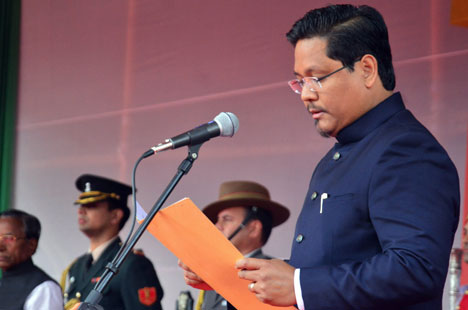
Shillong, May 6: The Narendra Modi government's decision to go ahead with the land exchange agreement with Bangladesh has earned the ire of pressure groups in Meghalaya, which have been demanding exemption of the state from the deal.
The Constitution (119th Amendment) Bill, which will operationalise the 1974 Land Boundary Agreement (LBA) between India and Bangladesh and facilitate exchange of territory, was approved by the Union cabinet yesterday and unanimously passed by the Rajya Sabha today. The bill will be taken up by Lok Sabha tomorrow.
Territories in Assam, West Bengal, Tripura and Meghalaya come under the purview of the bill. The legislation will allow exchange of enclaves and retaining of land in adverse possessions that fall in these states.
"We are dismayed as we have been demanding exemption of Meghalaya from the purview of the bill. This reaffirms the contention that the Centre is least bothered to safeguard the rights of landowners and people living along the international border," G.H. Kharshanlor, president of Hynniewtrep National Youth Front (HNYF), said. He warned that his group would not allow an inch of land to go to Bangladesh.
Khasi Students' Union (KSU) president Daniel Khyriem said they have always wanted Meghalaya to be excluded from the land-swap deal.
"Since we have already lost substantial land to Bangladesh since the 1971 war, we have been demanding that no more land should be transferred. We have requested several Union ministers to ensure that Meghalaya is exempted from the bill. But we are shocked that the Centre has gone ahead with the bill," he added.
Khyriem said the Centre should have accorded priority to the views of the local people before going ahead with its decision.
Kharshanlor, who is also the spokesperson for the Coordination Committee on International Border (CCIB), a conglomerate of several organisations, said the group would send a letter of protest to the Centre tomorrow, demanding exemption of Meghalaya from the purview of the bill.
The Congress-led state government, however, supports the bill and has been urging the Centre to ratify the Protocol to the 1974 Land Boundary Agreement signed between India and Bangladesh in September 2011 so that people on both sides of the border are able to derive the potential socio-economic benefits that a well-defined and settled border offers.
According to the first report of the Standing Committee on External Affairs, which vetted the bill, areas in adverse possession to be acquired by Meghalaya amounted to 240.578 acres.
These include Pyrdiwah (193.516 acres), Lyngkhat I (4.793 acres), Lyngkhat II (0.758 acres), Lyngkhat III (6.94 acres), Dawki/Tamabil (1.557 acres), Naljuri I (6.156 acres) and Naljuri II (26.858 acres).
However, under the deal, Meghalaya will have to transfer 41.702 acres of land in the Lobacherra-Nuncherra sector to Bangladesh.
Kharshanlor wanted to know from the government about the fate of the remaining land under dispute. "The total land under adverse possession is 559.7 acres. If 240.5 acres come to Meghalaya and 41.7 to Bangladesh, what about the remaining 278 acres of land?" he asked.
Land in adverse possession of India is an area contiguous to India's border and within its control but which is legally a part of Bangladesh. Residents of these adverse possessions are Indian citizens. The same applies to Bangladeshi adverse possessions.
Kharshanlor argued that the 2011 land-swap deal remains "unacceptable" as it was signed without considering the comprehensive survey report of the Coordination Committee on Indo-Bangla Border Fencing. It was constituted in 2007 by the Meghalaya government under the chairmanship of the then deputy chief minister, Donkupar Roy.
Following spot inspections in areas on the Indo-Bangladesh border in Khasi-Jaintia hills sector, the committee had submitted its report to the state government.
"The state government is well aware about the existence of the report but it appears that it has acted as if it never existed. We have also been meeting government officials to apprise them of the land deal, which we feel cannot be implemented in Meghalaya," Kharshanlor said.










